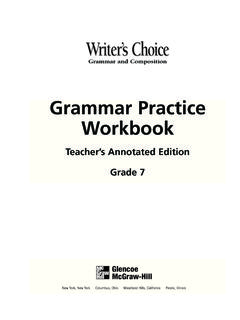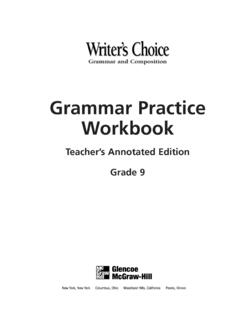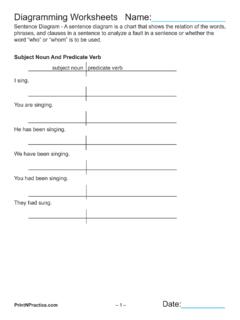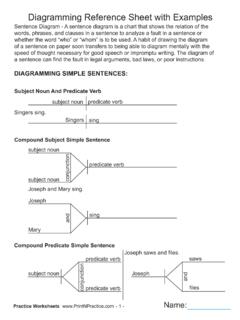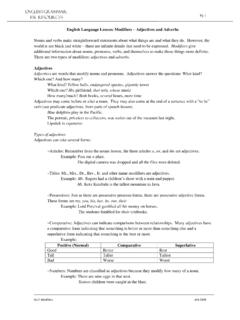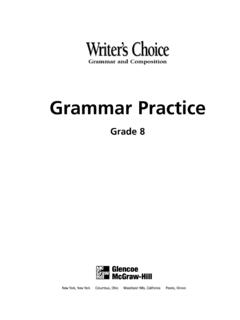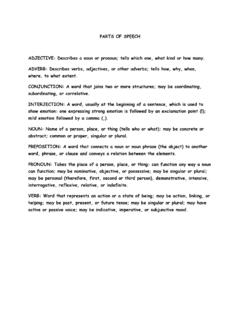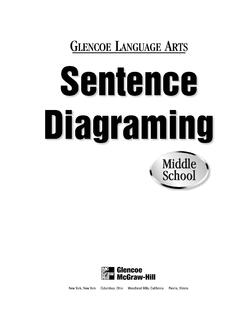Transcription of Grammar Practice Workbook
1 Grammar and Composition Grammar Practice Workbook Teacher's Annotated Edition Grade 6. Glencoe/McGraw-Hill Copyright The McGraw-Hill Companies, Inc. All rights reserved. Permission is granted to reproduce material contained herein on the condition that such material be reproduced only for classroom use; and be provided to students, teachers, and families without charge; and be used solely in conjunction with Writer's Choice. Any other reproduction, for use or sale, is prohibited without written permission of the publisher. Printed in the United States of America. Send all inquiries to: Glencoe/McGraw-Hill 8787 Orion Place Columbus, Ohio 43240. ISBN 0-07-823359-3. 1 2 3 4 5 6 7 8 9 024 04 03 02 01 00. ii Contents Unit 8 Subjects, predicates , and Sentences 2 Sentences and Sentence Fragments.. 1. Subjects and predicates .
2 2. Finding Subjects .. 3. Compound Subjects and Compound predicates .. 4. Simple, Compound, and Complex Sentences.. 5. Unit 9 Nouns Common and Proper Nouns .. 6. Singular and Plural Nouns .. 7. Possessive Nouns .. 8. Unit 10 Verbs Action Verbs and Direct Objects.. 9. Indirect Objects.. 10. Present, Past, and Future Tenses .. 11. Main Verbs and Helping Verbs .. 12. Present and Past Progressive Forms .. 13. Perfect Tenses .. 14. 9 Irregular Verbs.. 15. Unit 11 Pronouns 2 Using Pronouns Correctly.. 16. Pronouns and Antecedents .. 17. Possessive Pronouns .. 18. Indefinite Pronouns .. 19. Unit 12 Adjectives Adjectives and Proper Adjectives .. 20. Articles and Demonstratives .. 21. Adjectives That Compare .. 22. Unit 13 Adverbs Adverbs Modifying Verbs .. 23. Adverbs Modifying Adjectives and Adverbs .. 24. Adverbs That Compare.
3 25. Telling Adjectives and Adverbs Apart .. 26. Avoiding Double Negatives.. 27. iii Contents Unit 14 Prepositions, Conjunctions, and Interjections 2 Prepositions and Prepositional Phrases .. 28. Pronouns After Prepositions.. 29. Prepositional Phrases as Adjectives and Adverbs .. 30. Telling Prepositions and Adverbs Apart .. 31. 7 Conjunctions and Interjections .. 32. Unit 15 Subject-Verb Agreement Making Subjects and Verbs Agree .. 33. Problems with Locating the Subject .. 34. Agreement with Compound Subjects.. 35. Unit 16 Glossary of Special Usage Problems 2 Using Troublesome Words .. 36. Unit 18 Capitalization Capitalizing Sentences, Quotations, and Salutations .. 37. Capitalizing Names and Titles of People .. 38. Capitalizing Names of Places .. 39. Capitalizing Other Proper Nouns and Adjectives .. 40.
4 Unit 19 Punctuation Using the Period and Other End Marks .. 41. Using Commas I-A .. 42. Using Commas I-B .. 43. Using Commas lI-A .. 44. Using Commas Il-B.. 45. Using Commas Ill-A .. 46. Using Commas Ill-B .. 47. Using Semicolons and Colons .. 48. Using Quotation Marks and Italics.. 49. Using Apostrophes and Hyphens .. 50. Using Abbreviations .. 51. Writing Numbers .. 52. iv Grammar Practice Name .. Class .. Date .. 2 Sentences and Sentence Fragments Key Information A sentence expresses a complete thought. All sentences begin with a capital letter and end with a punctuation mark. A declarative sentence tells or states something. It ends with a period. An interrogative sentence asks a question. It ends with a question mark. An exclamatory sentence expresses a strong feeling. It ends with an exclamation point.
5 An imperative sentence commands someone to do something. It ends with a period. A sentence must have both a subject and a predicate in order to express a complete thought. The subject names whom or what the sentence is about. The predicate tells what the subject does or what it is like. Dr. Seuss (subject) wrote children's books. (predicate). A group of words that lacks either a subject, a predicate, or both is called a sentence fragment. Avoid sentence fragments when you write. A. Punctuating Sentences Correctly Rewrite each sentence, adding capital letters and end punctuation where needed. Then indicate whether the sentence is declarative, interrogative, exclamatory, or imperative. interrogative 1. do you know how to blow bubbles? _____. _____. imperative 2. tell me about your biggest bubble. _____. _____.
6 Declarative 3. my cousin once blew a bubble as big as a cabbage_____. Copyright The McGraw-Hill Companies, Inc. _____. exclamatory 4. what a great bubble that was! _____. _____. B. Forming Complete Sentences Correct these sentence fragments by adding words to make complete sentences. Remember to start each sentence with a capital letter and end it with the proper punctuation. Sentences will vary. 1. two small dogs _____. 2. gave me a present _____. 3. she always _____. 4. I sometimes _____. Writer's Choice: Grammar Practice Workbook , Grade 6, Unit 8 1. Grammar Practice Name .. Class .. Date .. Subjects and predicates Key Information The complete subject of a sentence includes all the words in the subject. The whole class visited the museum. The complete predicate of a sentence includes all the words in the predicate.
7 The whole class visited the museum. The simple subject is the main word or group of words in the complete subject. The whole class visited the museum. The simple predicate is the main word or group of words in the complete predicate. The whole class visited the museum. A. Identifying Complete Subjects and Complete predicates Underline each complete subject once, and underline each complete predicate twice. 1. My cousin visited South America last year. 2. She took a boat ride up the Amazon River. 3. The Amazon is the largest river in the world. 4. The river flows just south of the Equator. 5. The weather was hot and humid. 6. It rained almost every day. 7. Over fifteen hundred species of fish live in the Amazon. Copyright The McGraw-Hill Companies, Inc. 8. The jungle grows right up to the water's edge. 9.
8 She saw many exotic birds. 10. Her favorite was the toucan. B. Identifying Simple Subjects and Simple predicates Underline each simple subject once and each simple predicate twice. 1. Her younger brother took lots of photos. 2. His favorite photograph shows a giant butterfly. 3. He always kept his camera with him. 4. Several people asked him about his camera. 5. Once, the boat stopped at a small fishing village. 6. He got some good pictures of people at work. 2 Writer's Choice: Grammar Practice Workbook , Grade 6, Unit 8. Grammar Practice Name .. Class .. Date .. Finding Subjects Key Information Understanding word order can help you identify the parts of a sentence. Most statements begin with the subject. Jim Henson created the Muppet puppets. Questions can begin with part or all of the predicate, followed by the subject and the rest of the predicate.
9 Did Jim Henson create the Muppet puppets? You can find the subject of a question by rearranging the sentence into a statement. Jim Henson did create the Muppet puppets. Statements sometimes present the predicate before the subject. Out of nowhere came the answer. Imperative sentences (requests or commands) usually have an unstated subject. The word you is understood to be the subject. A. Rewriting Questions as Statements Rewrite each question as a statement. Underline each simple subject. 1. Did Robin Hood really take from the rich and give to the poor? _____. Robin Hood really did take from the rich and give to the poor. _____. 2. Was Sherwood Forest a safe place to hide?_____. Sherwood Forest was a safe place to hide. _____. Copyright The McGraw-Hill Companies, Inc. 3. Were the soldiers able to capture him?
10 _____. The soldiers were able to capture him. _____. 4. Did Robin escape? _____. Robin did escape. _____. B. Finding Subjects Underline each subject. Write (You) before the sentence with an understood subject. (You). _____ 1. Tell me another story. _____ 2. On the log stood Little John. _____ 3. Both men fell into the river. _____ 4. Out of the forest galloped the sheriff. _____ 5. Was Robin Hood a good leader? Writer's Choice: Grammar Practice Workbook , Grade 6, Unit 8 3. Grammar Practice Name .. Class .. Date .. Compound Subjects and Compound predicates Key Information A compound subject has two or more subjects that have the same predicate. The subjects are joined by the words and or or. Julia and Ramon worked in the bakery. A compound predicate has two or more verbs with the same subject. The verbs are joined by the words and, or, or but.
